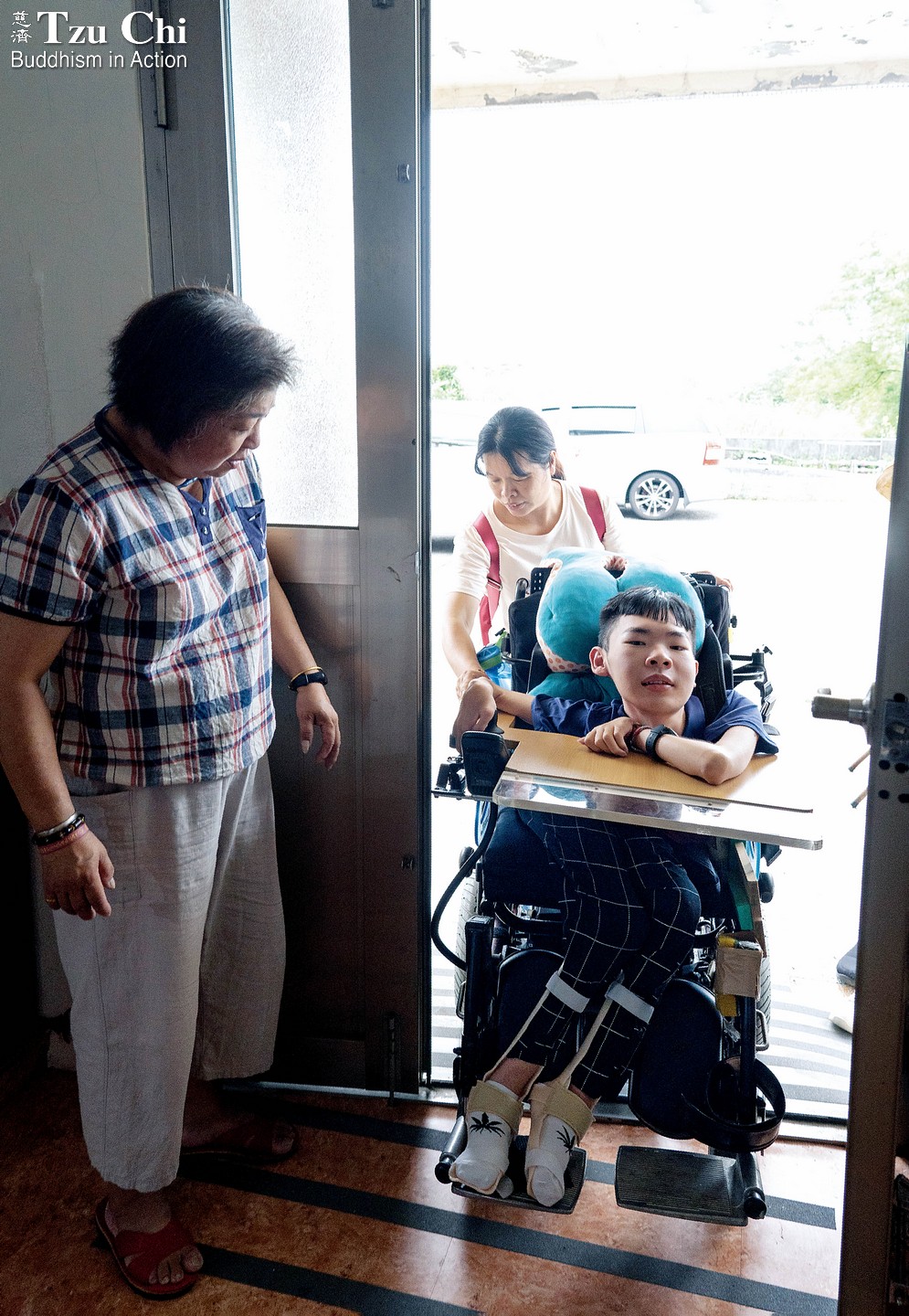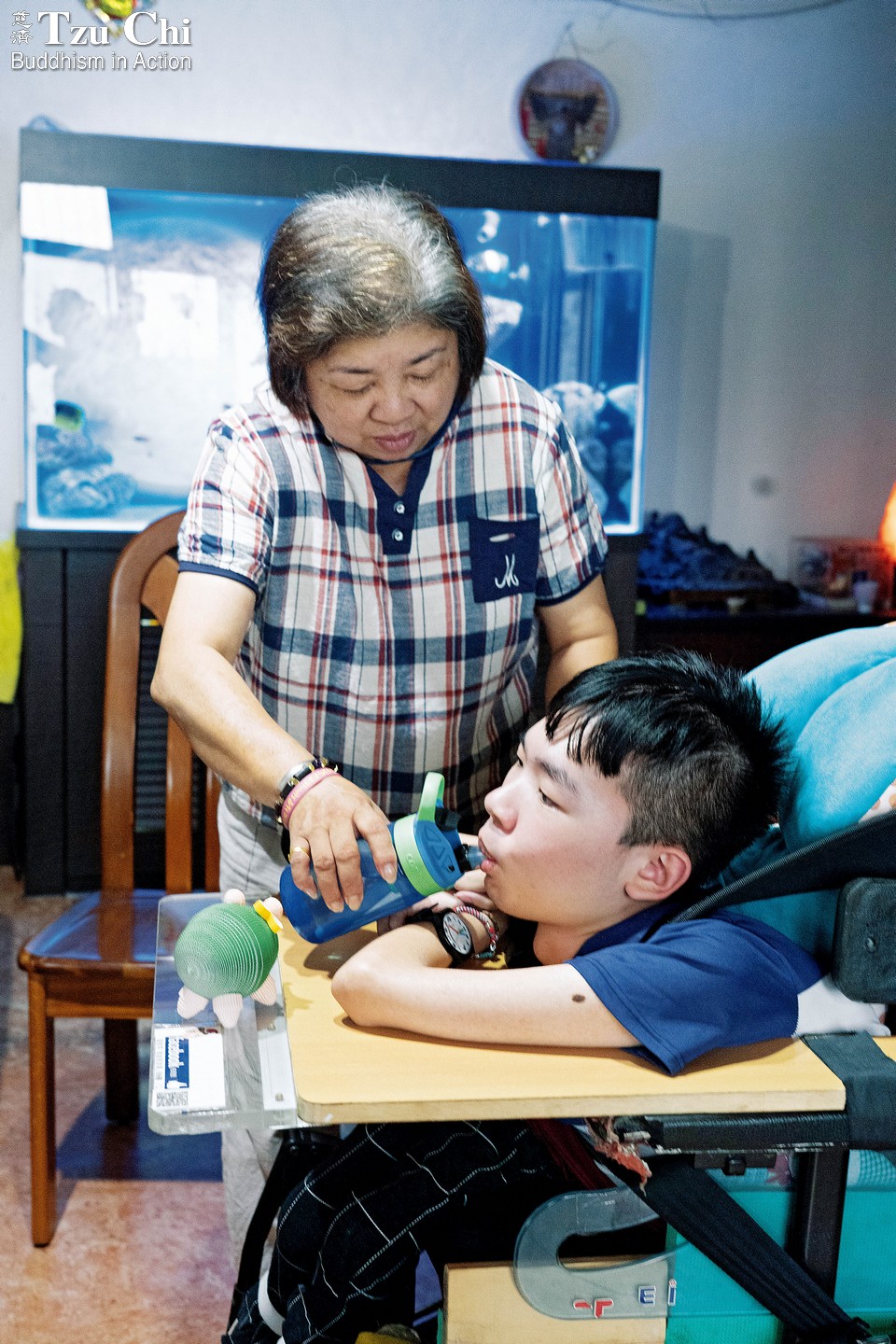By Chen Li-an
Translated by Tang Yau-yang
Photos by Hsiao Yiu-hwa
Jing-wei has learned to face the challenges in his life with a smile. This optimism comes from his grandma, but it is just one of her gifts to him. She cares for him, protects him, and brings light into his life. The two of them are perfect partners, learning and growing together on the path of life.

Jing-wei comes home from school at around four in the afternoon. When his shuttle bus for people with disabilities pulls in, his grandma puts down the wheelchair ramp so that Jing-wei’s caregiver can push him into the house.
We arrived on a fine day at an old house beside an orchard in Dongshan Township, Yilan County, Taiwan. A black dog tethered near the door barked at us relentlessly, defending its home against strangers, until a kind-looking, smiling woman walked out of the house. Li Mei-hua was the paternal grandmother of 21-year-old Chen Jing-wei, who won the Presidential Education Award in 2020.
As soon as we entered the house, Li enthusiastically directed our attention to a photo displayed on the TV stand. She explained that it had been taken not long before, when her entire family took a trip together. Jing-wei, sitting in a wheelchair in the picture, smiled broadly. He doesn’t take trips often, so this photo captured a particularly special time for the family.
The medical journey
Li shared with us that Jing-wei had lived mostly with his babysitter as an infant rather than his parents, who had been too busy working to care for him. Nobody had noticed anything unusual with the baby, until one day a relative who lived close to the babysitter asked Li an alarming question: “Why is your grandson so limp? Infants at seven or eight months of age can usually sit and crawl around, but not yours.”
Upset at hearing that, an uneasy Li took time off from work and went to the sitter’s home to take a look for herself. She discovered that her grandson’s arms and legs did indeed look limp, and that he wasn’t moving and exploring very much, not nearly as much as would be expected for a typical infant his age. Worried and concerned, she and her daughter-in-law immediately took Jing-wei to the doctor.
It wasn’t a simple matter to determine what was wrong with Jing-wei. When one doctor failed to explain the infant’s condition, Li and her daughter-in-law would try another. The two of them tirelessly took him from one major hospital to another in northern Taiwan for a diagnosis.
Every hospital they visited put Jing-wei through a new round of tests. Blood tests were routine, but even mundane blood draws became traumatic episodes. Because Jing-wei was not yet one year old, his arms were tiny and his veins even tinier. Often a medical worker would have such a difficult time locating a good vein that Jing-wei had to endure repeated needle pokes just to have a blood sample drawn. All the while he would scream bloody murder, with great drops of blood falling from his arm. Scenes like these unsettled Li so much that she couldn’t even be in the same room when he was having his blood drawn.
“Most doctors couldn’t find anything wrong with Jing-wei, or they said that he was too little to be examined and diagnosed,” said Li. In desperation, she and her daughter-in-law, following a suggestion, took a southbound train to the Mennonite Christian Hospital in Hualien, eastern Taiwan. It was there that eight-month-old Jing-wei finally received a definitive diagnosis: spinal muscular atrophy (SMA), a rare disease. Li finally knew what was wrong with her grandson. Well, sort of.
“The doctor said that Jing-wei’s problem was the result of defective chromosomes,” Li recalled, “that his ‘soft skeleton’ disease was congenital. I didn’t understand a word of it.” The only question she asked the doctor was “How long will my grandson live?” The doctor told her bluntly that there was no effective therapy for the disease, and that those who had it lived, on average, only into their teens.
Li was devastated by the bleak prognosis. What could she do? With no cure to pursue, the doctor recommended that the only thing that she could do was to keep him healthy in order to lower the risk of complications. He also informed Li that Jing-wei’s body would become more and more distorted as he grew older, squeezing his organs to one side of his body. It would then become especially important to take good care of his respiratory system.
Though Li could now see the situation more clearly and know how to care for her grandson, it was still all extremely hard to take. “I was very sad when the doctor told me the facts,” she said.
Li Mei-hua carefully adjusts the angle of the water bottle so that Jing-wei can drink from it more smoothly. To her, taking care of her grandson is not hard work. Her only hope is that he will remain safe and sound and healthy.

Grandma and grandson
Jing-wei’s parents divorced when he was ten months old. His father left town afterwards to work, but stays in touch with his family via his cell phone. Li took Jing-wei under her wing and started rearing him with her husband. She gave him the best care she could. Though she was still sad about her grandson’s condition, she knew that life had to go on.
Spinal muscular atrophy occurs in one of every 10,000 births. It is an autosomal recessive genetic disorder. With SMA, the patient’s anterior horn cells (motor neurons) in the spinal cord progressively degenerate. Muscular atrophy and weakness ensue. SMA is divided into three types based on the age of onset and severity of the disease. Jing-wei is a type 2 sufferer, given the extreme severity of his condition.
Jing-wei could sit by himself when he was very young—though even that was difficult—but his body began to shift a little to one side by the time he started elementary school. Once this started, he could no longer sit up by himself. Li ordered corrective clothing for him to slow the rate of deformation, but it was very expensive: 9,000 Taiwanese dollars (US$300) per item, a big sum for the family, especially more than a decade ago. “We didn’t know at the time that we could apply for a subsidy or for reimbursement from the National Health Insurance program,” she said. “My husband and I had to borrow money to pay for it.”
When Jing-wei was due to start elementary school, Li became concerned that he might be bullied, discriminated against, or beaten up by other kids at school. She even considered not letting him go to school, just to protect him. She only changed her mind when the special ed director at the school paid a home visit and promised that he would never allow Jing-wei to be bullied at school.
Jing-wei, now a sunny, upbeat college student, hasn’t always been that way. For a time in elementary school, he felt gloomy and inferior. His grandmother worried that if he remained that way, he would make himself unwelcome. Who wanted to be close to someone who always wore a frown? “I told him at the time to smile at everyone, whether they were his teachers or classmates,” Li said. Fortunately, Jing-wei heeded her advice and started to smile more, which gradually changed him from the inside and turned him into the optimistic, cheerful person that he is today.
Li told us that by third grade Jing-wei still couldn’t write his own name well. “How could his penmanship be so poor?” she remembers thinking to herself. Only later did she find the answer to her own question: his hands had started to deform. The deformity of his fingers and wrists intensified with time. He was still able to write with a pen and eat with a spoon before high school, but after that, he had to use a computer to take the place of handwriting.
Li is grateful to the many people who extended a helping hand to Jing-wei throughout his years as a student. “He wasn’t interested in school at all before seventh grade,” Li said, but good teachers turned him around. One of Jing-wei’s teachers once said to Li, “Grandma, you must let Jing-wei continue going to school. He has a normal intellectual capacity, and he’ll work hard if he really wants to go to college.” It was this type of guidance and encouragement from teachers along the way that sparked Jing-wei’s love of learning. They inspired him to study hard and discover his purpose in life.
Li especially cited those teachers that made the biggest impact in his education: Teachers Li and Guo and Directors Wu and Jian in Jing-wei’s junior and senior high schools, and Teacher Chen in college. Li will not for a moment forget the warmth and patience they have shown her grandson.
She is the center of his world, and he of hers
Li, 67, confessed that there have been times during all those years of caring for Jing-wei that she’s been upset or unhappy. Oftentimes she’d become annoyed by petty things, such as why it took Jing-wei so long to finish a bottle of water. It was often over such petty things that the two of them argued.
Li’s husband has stood by her for the last 21 years as they cared for their grandchild. They used to work together on such tasks as helping Jing-wei take a shower or lifting him out of his wheelchair into his bed, but as they got older, they learned they had to stop overexerting themselves when taking care of him. “Grandpa now often feels weakness in his legs and needs to undergo regular physical therapy,” Li said of her husband. Once while holding Jing-wei in his arms, he tumbled and the two of them fell flat on the floor.
Realizing that they were no longer young, Li and her husband applied to social welfare organizations, including the Taiwan Foundation for Rare Disorders and Taiwan Spinal Muscular Atrophy Families, for help to install a patient transfer device in their home. This would prevent similar hazardous incidents from happening again.
Li said that Jing-wei is particularly vulnerable to the flu or a cold when his immunity goes down. She remembers him being hospitalized almost every year as a result. He has been such a frequent patient in the hospital that all the nurses on the floor where he stays know them. Before Li retired, she often had to rush back and forth between her home, her breakfast shop, and the hospital, juggling her time taking care of her grandson, her household, and her work. That being said, she told us cheerfully, “Jing-wei didn’t catch a single cold last year!”
Li couldn’t help feeling a sense of satisfaction as she looked at the wall covered by media reports on Jing-wei and the many certificates of achievement he had won, including that for the Presidential Education Award. “It’s a good thing that he’s been willing to apply himself in school,” she said of her grandson, “and also a good thing that I let him go to school.”
Li’s hearty character and selfless dedication have brightened Jing-wei’s life. The two of them are like great partners, taking care of each other and influencing each other on the path of life. The support from his family has undoubtedly played a big part in helping Jing-wei develop a strong resilience against life’s challenges. Seeing how Jing-wei is realizing his dreams step by step, including going to a university and giving inspirational talks, Li prays that he will remain safe and sound and healthy, and that he will transcend the challenges facing him and create a path all his own.



